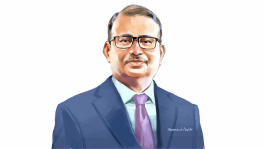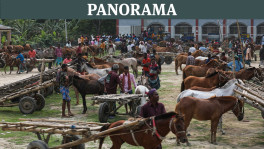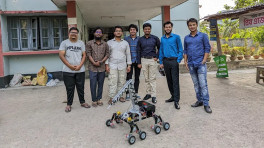Ukrainian troops recapture first village after Russia orders Kherson retreat

Jubilant Ukrainian troops proclaimed the liberation on Thursday of the first village they recaptured since Moscow ordered one of the war's biggest retreats, but Kyiv remained wary, warning that fleeing Russians could turn Kherson into a "city of death".
A small group of Ukrainian soldiers was shown on state television in the centre of the village of Snihurovka around 55 km (35 miles) north of Kherson city, greeting dozens of residents in a square with a Ukrainian flag fluttering from a pole behind them. Reuters verified the location of the video.
"Today, on 10 Nov, 2023, Snihurivka was liberated by the forces of the 131st Separate Intelligence Battalion. Glory to Ukraine!" a commander declared as the locals applauded, cheered and filmed the soldiers on their phones.
Petro Lupan, 46, distributing bread to residents along another part of the front line north of Kherson, told Reuters he had just learned of the recapture of Snihurivka from a friend he had reached by phone in the village.
"I can't find words to describe my feelings," he said.
The advance took place less than a day after Moscow ordered its troops to withdraw from the entire Russian-held pocket on the west bank of the Dnipro River, including Kherson city, the only regional capital Russia had captured in nine months of war.
Ukrainian officials have so far mostly been wary in public, warning that Russians may still be planning to fight and sow destruction on their way out.
An adviser to Ukraine's president said on Thursday Russia wanted to turn Kherson into a "city of death", mining everything from apartments to sewers and planning to shell the city from the other side of the river.
"This is what (the) 'Russian world' looks like: came, robbed, celebrated, killed 'witnesses', left ruins and left," Mykhailo Podolyak wrote on Twitter.
Russia denies it abuses civilians despite bombarding residential areas throughout the conflict. It has been evacuating thousands of civilians from the Kherson area in recent weeks in what Ukraine calls a forced deportation.
'No gifts'
The Ukrainian military said it could neither confirm nor deny that Russian forces were indeed pulling out.
Zelenskiy himself was also cautious, mentioning Kherson just once in his daily overnight television address. Ukrainian forces were strengthening their positions "step by step" in the south, he said. "The enemy will make no gifts to us."
Kyiv has hoped to trap thousands of Russian troops in the pocket, and appears to be advancing cautiously to protect its own troops, while inflicting as much damage as possible on the Russians as they try to escape across the river.
At the front north of Kherson there was less artillery audible than usual. A heavy fog had settled in overnight, light snow fell and the ground was coated with frost. Ukrainian troops manning checkpoints were buttoned up against the cold.
Vitaliy Kim, governor of Mykolaiv region which includes Snihurivka, stopped short of proclaiming the area liberated pending an official announcement by the military, but said authorities were planning a shipment of aid there.
Russia's retreat order, just over a month after President Vladimir Putin proclaimed the annexation of an area he said would be part of Russia forever, is one of the most humiliating defeats Moscow has suffered so far. Russian state media and pro-Kremlin war hawks defended it as a necessary move while acknowledging a heavy blow.
"I know for sure that this decision was not easy for anyone. Not for those who took it, nor for those of us who understood it would be so but still prayed it wouldn't happen," said Margarita Simonyan, head of RT, Russia's international propaganda channel.
Defence Minister Sergei Shoigu was shown on TV on Wednesday giving the retreat order in response to advice from his top commander who said it was necessary to save the lives of troops who would be better able to defend the Dnipro's opposite bank.
'Real problems'
General Mark Milley, chairman of the US joint chiefs of staff, said initial indicators suggested Russia was following through with its withdrawal, though it could take time to complete. US President Joe Biden said the withdrawal showed there were "some real problems with the Russian military."
The retreat follows Russian defeats in northern and eastern Ukraine, and leaves Moscow with only limited gains to show for a "special military operation" that made it a pariah in the West, killed tens of thousands of its soldiers and led to its first nationwide mobilisation since World War Two.
Russian forces are still holding on to other gains in the south, including a vital land route connecting Russia to the Crimea peninsula it seized in 2014, and some cities in the east that they mostly obliterated while capturing them.
For Ukraine, which has endured nine months of bombardment and occupation that has killed thousands of its civilians, victory in Kherson would strengthen the case that it can defeat Russia on the battlefield, and may quiet some Western voices calling for it to negotiate a deal that would cede territory.
"This is a validation of Ukraine's military strategy and the approach taken by its senior leadership. They are succeeding and the Russians know it.," tweeted Mick Ryan, a retired Australian general.
"Now is NOT the time to force Ukraine into negotiations. The Russians might be weakened but they are not giving up on their territorial aspirations. They will have to be beaten on the battlefield and pushed out of Ukraine."
A Russian withdrawal would directly free hundreds of thousands of Ukrainians from occupation, and protect hundreds of thousands more, in areas such as nearby Mykolayiv, from artillery that has hammered civilian homes.
It gives Kyiv momentum not only to recapture territory seized in this year's invasion, but also to threaten Russia's hold on lands it grabbed in 2014, including Crimea.
"By taking control of the entirety of the west bank of the Dnipro, Ukrainian forces will now be able to target all the Russian ammunition depots and command and control centres between the Dnipro and Crimea with artillery," said Dale Buckner, CEO of international security firm Global Guardian.


 Keep updated, follow The Business Standard's Google news channel
Keep updated, follow The Business Standard's Google news channel
















